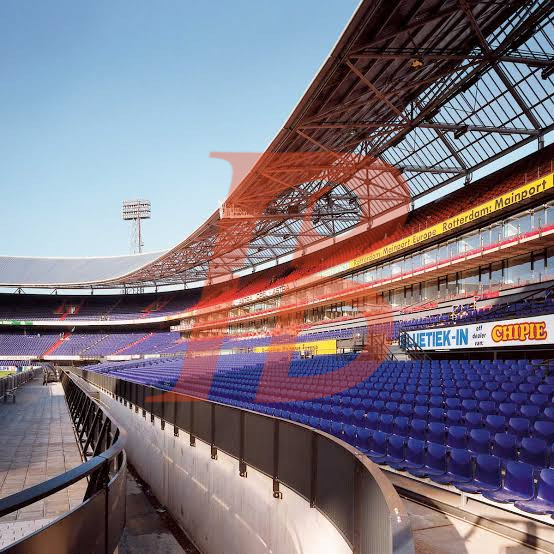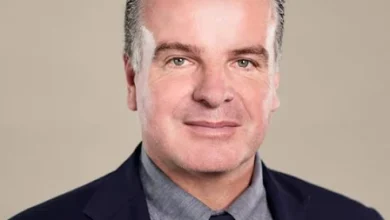BREAKING NEWS: STADION FEYENOORD KRIJGT EEN DRAMATISCHE NIEUWE UITSTRALING NU EEN CONTRACT VAN £50 MILJOEN IS TOEGEKEND AAN TWEE GROTE EUROPESE BOUWBEDRIJVEN OM HET ICONISCHE DE KUIP TE TRANSFORMEREN TOT EEN ULTRAMODERN VOETBALSTADION, MET BEHOUD VAN DE HISTORISCHE ERFENIS…
BREAKING NEWS: STADION FEYENOORD KRIJGT EEN DRAMATISCHE NIEUWE UITSTRALING NU EEN CONTRACT VAN £50 MILJOEN IS TOEGEKEND AAN TWEE GROTE EUROPESE BOUWBEDRIJVEN OM HET ICONISCHE DE KUIP TE TRANSFORMEREN TOT EEN ULTRAMODERN VOETBALSTADION, MET BEHOUD VAN DE HISTORISCHE ERFENIS...

ROTTERDAM, May 24, 2025 — In a major infrastructural and symbolic leap forward, Feyenoord Rotterdam has officially announced the awarding of a transformative £50 million renovation contract for its iconic stadium, De Kuip, to two leading European construction firms. The ambitious facelift signals the club’s most significant stadium development in decades and promises to usher in a new era of safety, technology, and fan engagement for one of the Netherlands’ most storied football institutions.
The decision to proceed with the stadium renovation project was confirmed during a high-profile press briefing held today at the club’s executive offices in Rotterdam. Senior officials from Feyenoord, representatives of the construction companies, and Rotterdam city planners were in attendance to underscore the gravity and scale of the endeavor. According to the official club statement, the renovation is set to begin in the summer of 2025 and is projected to reach completion by the end of 2027.
A HISTORIC TRANSFORMATION FOR A HISTORIC VENUE
De Kuip—officially known as Stadion Feijenoord—has stood as the spiritual home of Feyenoord since its opening in 1937. With a legacy steeped in football tradition, De Kuip has hosted numerous historic matches, including European finals and international fixtures. However, in recent years, growing concerns over outdated infrastructure and UEFA compliance standards have prompted urgent calls for modernization.
Club president Toon van Bodegom highlighted the necessity of this overhaul, stating:
“De Kuip is the heart of Feyenoord, and its preservation and evolution are not just strategic—they are emotional. We are not building a new identity; we are fortifying the soul of the club.”
The £50 million investment is earmarked specifically for reinforcing structural safety, improving access for persons with reduced mobility, modernizing fan amenities, and introducing new digital technologies to enhance match-day experiences.
THE COMPANIES BEHIND THE REVAMP
The two firms awarded the contract are Netherlands-based BAM Bouw en Techniek and the renowned German engineering giant Hochtief AG. Both companies bring a wealth of expertise in stadium development and infrastructure renovation. BAM Bouw en Techniek has previously undertaken large-scale Dutch projects including Amsterdam’s Johan Cruyff Arena upgrades, while Hochtief has worked on several German Bundesliga stadiums and large-scale transportation infrastructure in Europe.
According to sources close to the deal, the £50 million contract was fiercely contested by a shortlist of five international firms, but the joint bid by BAM and Hochtief offered a balanced blend of local understanding, engineering precision, and competitive pricing.
“This collaboration represents a perfect fusion of Dutch passion and German precision,” said Daniël Oosterhout, lead project manager from BAM Bouw en Techniek.
“Our aim is not just to renovate, but to revolutionize fan experience while preserving the cultural essence of De Kuip.”
WHAT WILL CHANGE AT DE KUIP?
The renovation plan includes several key components:
- Structural Reinforcement: De Kuip’s iconic steel structure will undergo reinforcement to meet modern UEFA and FIFA safety standards, extending the stadium’s lifespan by several decades.
- Roof Redesign: A semi-transparent, energy-efficient roof will be installed to offer improved lighting and coverage, ensuring fan comfort during all seasons while integrating solar technology.
- Seating Upgrade: All 51,117 seats will be replaced with ergonomic models, with improved legroom and accessibility. VIP sections and family zones will also be expanded.
- Digital Infrastructure: Wi-Fi 7 connectivity, 5G towers, and interactive touch-screen kiosks will be integrated into the stadium for a more immersive digital experience.
- Fan Zones and Hospitality: A new multi-level fan zone with retail shops, cafes, and a Feyenoord museum extension will be developed beneath the stands. Hospitality suites and press areas will also be revamped to meet international standards.
MATCHDAY CONTINUITY DURING RENOVATION
One of the most pressing concerns addressed during the press conference was whether Feyenoord will continue to play at De Kuip during the renovation period. The club confirmed that the stadium will remain operational, with works scheduled in phases to avoid disrupting the Eredivisie season or European fixtures.
“This project has been meticulously scheduled to ensure that fans can still cheer their team at De Kuip,” said construction director Heiko Baumann of Hochtief.
“Work will be done during off-seasons, international breaks, and in carefully sealed zones to ensure safety and continuity.”
Safety barriers, additional lighting, and controlled entry points will be implemented to protect fans and players during active construction phases. The club will also communicate bi-weekly updates via its website and a new app developed specifically for stadium redevelopment tracking.
FUNDING AND FINANCIAL STRATEGY
The £50 million budget is being financed through a combination of club reserves, a Rotterdam municipal grant, long-term commercial partnerships, and a unique “stadium bond” initiative. Launched earlier this year, the stadium bond allows supporters to invest in the project with guaranteed annual returns and exclusive benefits such as VIP access and commemorative merchandise.
According to Feyenoord’s CFO Jeroen Slop:
“This project is not a cost—it is an investment. The stadium bond was an instant success, with over €9 million raised within the first month of its announcement. The rest of the funding has been secured through strategic planning and prudent fiscal management.”
Notably, the club has steered away from risky short-term loans or asset sales, choosing a model that emphasizes sustainability and long-term growth.
REACTION FROM THE FEYENOORD FAMILY
The announcement has been met with enthusiastic approval from fans, former players, and club legends. On social media, the hashtag #NewKuip trended nationally within hours of the press conference, with thousands of supporters expressing their joy at the modernization of their beloved stadium.
Former Feyenoord star Giovanni van Bronckhorst tweeted:
“De Kuip shaped me. To see it now stepping into the future makes me immensely proud.”
Feyenoord’s current head coach Robin van Persie also shared his excitement:
“This project reflects the ambition we hold not only on the pitch but off it. It gives our players, staff, and supporters a reason to dream big.”
Supporters’ groups have pledged their assistance in maintaining the vibrant match-day atmosphere during the transitional years. Tifos and banners already commemorate the new era, with plans for a massive unveiling choreographed on opening day of the 2025/26 Eredivisie season.
IMPACT ON ROTTERDAM AND DUTCH FOOTBALL
The redevelopment of De Kuip is expected to have broader implications for the city of Rotterdam and Dutch football at large. Economically, the renovation is projected to generate over 2,000 local jobs during construction and stimulate surrounding businesses through increased match-day footfall and tourism.
Rotterdam Mayor Ahmed Aboutaleb praised the club’s decision:
“Feyenoord is more than just a football club—it is a cornerstone of Rotterdam’s identity. This initiative will ensure that our city remains home to one of Europe’s finest football venues.”
Additionally, the improved stadium may allow the Netherlands to bid more competitively for hosting international tournaments, as De Kuip will now meet the full array of UEFA and FIFA standards for elite competitions.
THE ROAD AHEAD
Feyenoord has confirmed that demolition and prep work will begin immediately following the conclusion of the current football season. A ceremonial groundbreaking event is scheduled for late July 2025, where club icons, city officials, and supporters will gather to mark the historic moment.
A countdown clock has already been installed near the club store at the stadium’s entrance, displaying the days until “New Kuip” is complete. A time capsule containing jerseys, fan messages, and photographs will be buried beneath the new fan zone, connecting past, present, and future generations of the Feyenoord family.
CONCLUSION
The £50 million renovation of De Kuip is not just an architectural endeavor—it is a bold statement of Feyenoord’s enduring relevance, competitive ambition, and deep bond with its supporters. As construction crews begin their work and fans fill the stands under newly lit skies, the message is clear: Feyenoord’s heart still beats, stronger and louder than ever.
With the dawn of “New Kuip,” Feyenoord is not merely preserving history—it is making it.

















